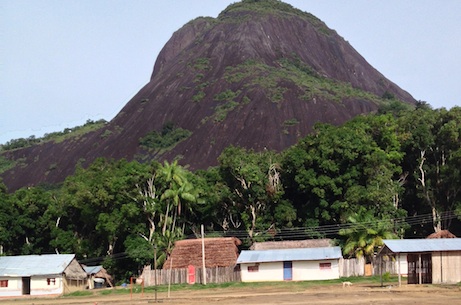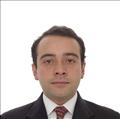
Gustavo Nicolas Paez talks about his work at Colombia's Ministry of Health and how economics needs to take account of local conditions, especially in developing countries.
When Gustavo Nicolas Paez started work at the Colombian Ministry of Health two years ago the first issue he dealt with was pricing health insurance. The insurance system assumed people go to hospital when they are sick, but this does not work for everyone, for instance, the very diverse indigenous communities living in the jungle.
In the jungle it can take three or four days to get to hospital. “If you are sick you don’t want to spend four days in a very small boat going to hospital,” he says. It made more sense to get the doctors into the jungle to do health prevention work and ensure people got to hospital before they became very sick.
Gustavo, who begins an MPhil in Economic Research at the University of Cambridge in the autumn, is interested in economics and tackling inequalities, but he says economic models need to be adjusted in order to be applied to real world situations.
At the Health Ministry, he has worked on almost every topic from financing health systems to climate change. Because of this experience, he recognises the importance of an interdisciplinary approach to real world problems. He says: “We need to link up all sectors and work with them on problems. Especially in health: People usually think of health as being about hospitals. We need to get out of that hospital mentality and focus on wellbeing as well as disease. This means that we have to go where people live and work and work with other sectors to create a healthy environment and prevent disease occurring,” he says.
Inequality
Gustavo’s interest in economics and inequality began at an early age. He was born in Bogota – his father is a lawyer and his mother is an engineer in the oil industry – but he spent a lot of his childhood on his grandparents’ farm. There he would spend his time catching frogs and helping milk the cows with the children of the farm workers. The experience gave him an early understanding of inequality and a commitment to improving the lives of the poor. “I compared my life and the lives of my friends on the farm, and even though we were the same, our circumstances were really different,” he says. Through his farm experiences he developed both a love of ecology, but also an interest in people. “The experience on the farm structured my way of thinking about what I wanted to do,” he says.
Gustavo liked to study, but always in a way which had a practical application. He excelled at maths and took part in Maths Olympics representing his country. During his school years, he also took advantage of a Ministry of Environment scheme to visit Colombia’s natural parks and write articles about them for his peers. “The main goal of this project was to create environmental awareness in my classmates,” he said. He opted to do a double major in economics and industrial engineering at the Universidad de los Andes in Bogota and took maths and environmental studies as minors. He felt his two majors would give him the technical skills he needed to understand the kind of problems he was interested in. He says: “With economics I could build castles in the sky and with industrial engineering I could build them on the Earth.”
His undergraduate degree lasted four and a half years and during it he signed up for summer schools abroad. He studied at Yale, Cornell, the London School of Economics and the Santa Fe Institute. “I like to travel and meet different people who may have different ideas,” he says.
Social mobility
He also combined his undergraduate studies with being a research assistant in the economics department of his university. He co-authored two projects – one was on social mobility and compared Colombia with Mexico and Chile, looking at the reasons why Chile had better social mobility. He says this was due to greater access to education among all sectors of society. The other research project focused on the quality of higher education in Colombia, comparing public and private universities. It found that private universities offered both the best and the worst quality experiences of higher education.
The opportunity to do research came about due to his mathematical skills since the work focused on computer analysis of data. For the research he was working with the Dean of Economics who was appointed Minister of Health. He asked Gustavo to move with him to the Health Ministry to be his adviser. While he was still finishing off the research projects, Gustavo started work at the Ministry in October 2012 and has been there ever since.
Gustavo kept up his academic work alongside his Ministry work, doing a masters in his spare time at the Universidad de los Andes. He then looked around at economics courses outside Colombia to continue his studies. “I want to learn more about different economic models, but the biggest challenge is to apply these models to local regions. They tend to be designed for developed countries,” he says.
Gustavo, who also does some work as a teaching assistant in econometrics and sustainable development, chose Cambridge mainly due to its college system which he says encourages the kind of interdisciplinary life that he thinks is vital for dealing with global challenges. He found out about the Gates Cambridge Scholarship through the application process and this autumn, when he starts his MPhil, becomes the second Colombian to be given the award.
*Picture: an indigenous community called "El Remanso" is two hours from the nearest town and was one of those visited by Gustavo in his Ministry of Health role.

Gustavo Nicolás Paez
- Alumni
- Colombia
- 2014 MPhil Economic Research
2015 PhD Economics - Sidney Sussex College
Most of the people have no choice about being poor, this decision comes with the cradle. Due to my life experience I consider that it is my duty to work for them, so that they can have the same opportunities in life, independently of the birth conditions. I am an economist and an industrial engineer. With them I have been able to work in diverse projects (in the health area) that promote this equality. Yet, each time I found more differences between the assumptions in which economic theory is made and the developing world. In my MPhill I worked to understand better the statistical tools so that now, in the PhD, I can build theory, based on network models, to understand how the development of a region cannot be studied alone, but it should be embedded within its geographical context. In this way, with my study, I want to help in the construction of better public policies.












